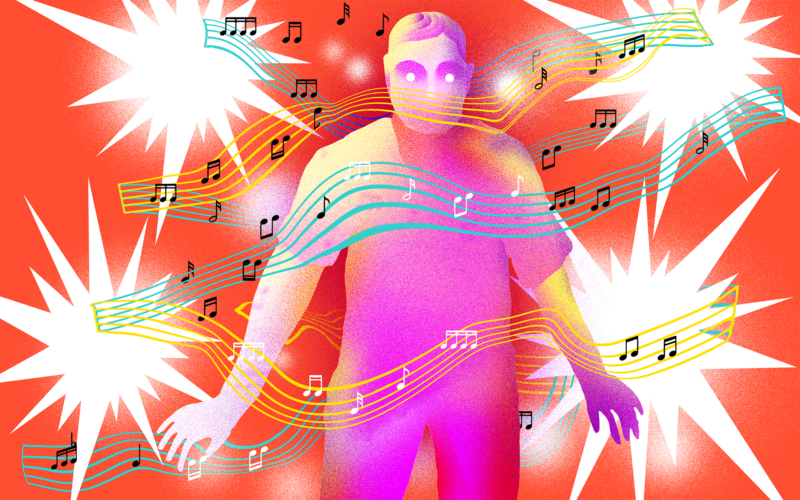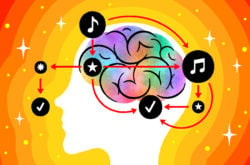Illustration: Daniel Zender
Anyone making music or art of any form likely began on their creative path with a reason for doing so, however simple.
Maybe it was fun. Maybe it was inspired by exposure to other art. Maybe it was a way to explore one’s self or spend time with others. As time goes on and our work becomes more habitual, we might not actually consider the purpose of what we’re doing. It can be years down the line until we stop and wonder: “So, this music thing… What’s it all for? Why am I doing this?”
What does it mean to spend ten-hour days or sleepless nights in the studio searching for your creative identity? What does it mean to sacrifice your free time or even financial stability to work on your craft? The gravity of these questions can weigh heavy when the growth isn’t so tangible or our reward-seeking mentality is left disappointed. Maybe the press didn’t click with that last release. Maybe your inbox isn’t exactly flooding with booking offers and label inquiries like you were hoping it would be. Did all of those hours spent on that record even move the dial?
Artists often conflate their self-value with their work. “My life is my art,” one might say. “I am my work.” More dangerously, artists can equate their self-value with the “success” of their work. Fortunately, we’re in control of how we define success for ourselves. You probably have at least a vague notion as to why you’re making music (“I enjoy it,” “it’s fun,” etc.), but being as clear as possible with yourself in respect to why you’re making music will build a strong foundation for your practice and your mental health. Let’s explore some healthy perspectives on finding meaning and purpose in one’s artistic practice.
Creating for yourself vs. creating for others
Before we begin, let’s return to the question: “Did all those hours spent on that record even move the dial?” It might be interesting to counter-ask: what is the dial? What is it measuring here? Career momentum on a scale of 0 – 100? Acceptance measured in units of likes? If this is the case—and wow, does society trick us into letting it be—then the meaning of your life as an artist is chasing external gratification and ambiguous rewards. Perhaps your goal is more specific: a Pitchfork review, or an income of $40,000/year. It’s okay to have materialistic goals—they can amount to survival—but sometimes, they may still leave us feeling empty or without purpose. After all, how much meaning can one find in experimenting endlessly, making things with no ascertainable value in hopes of a commensurate monetary reward? There must be more to the artistic life than this.
There’s a selfless merit and commendable generosity to making work for others’ enjoyment, but satisfying the abstract, moving target of what others will like (or more accurately, what you think others will like) can be exhausting. There are a few solutions to this problem that can bring an immense sense of purpose to one’s creative practice and life.
One such approach is insisting on a creative process that’s focused on bringing yourself joy. Being content with finding satisfaction from within isn’t a selfish pursuit, nor is it without its impact on the world. If you’re making work that brings you joy, you’ll then be bringing more joy into the world through your every interaction with it. If your goal is to make an impact, you are! Even if no one hears the music but you. If the work is bringing you joy and you’re therefore engaging the world with more joy, your music is of benefit to both you and your environment.
Another alternative to creating with your audience’s satisfaction in mind, while still serving their best interests, is making the work that you want to hear. If you would want to hear the kind of music you’re making and you trust your taste, odds are others will too. Making something that you think others will like can often backfire, resulting in music neither you nor your audience actually care for.
Building a narrative
We often create music without thinking about why we’re making it. It’s okay to operate on intuition and make music for music’s sake, but it may still benefit you to ask yourself: What is the music about? Moreover, what are you all about? Before even beginning a project and arriving at an artistic identity, it can be elucidating to define some themes and create a language around what you and your work are all about. The purpose of your music can now be to tell your story, or at the very least, you’ll have an angle that can be expressed in words.
Another way to anchor your work in meaning is to align it with a cause, be it social or political in nature. If you choose to go this route, the purpose of your music can be to bring awareness to something greater than yourself. This additional dimension of thematic foundation to a creative project can work wonders for the urgency and vitality of a project. Your work can have meaning as a social commentary through lyrics, or even more subtle means such as track titles if you make instrumental music.
It’s natural to want others to enjoy your music, and even more natural to want the money you need to support yourself while making it. However, deriving your sense of self value from anywhere but within is a dangerous game than can be circumvented by the approaches above and heaps of mindfulness. Besides, recognition and financial stability often have an interesting way of arriving as an indirect result of rooting oneself in a greater sense of purpose. A sense of purpose based on cultivating inner joy and meaning in one’s life is a magnetic field to which the world is drawn. Don’t let yourself be worn down by the moving targets of external gratification. It might take a leap of blind faith that it will work out, but next time you work on music I encourage you to do it for yourself.
Spark inspiration for your music with expertly-curated loops, one-shots, MIDI, presets, and more:
February 3, 2022



